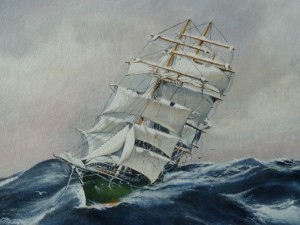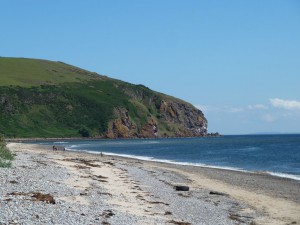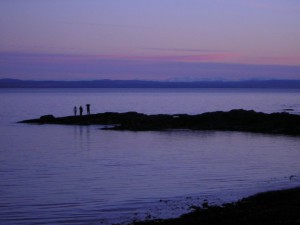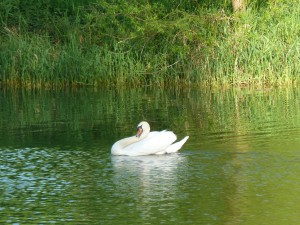An-uiridh sgrìobh mi mu aon òran Gàidhlig ainmeil le ceanglaichean ris a’ mhuir – An Ataireachd Àrd, agus seo fear eile, Fear a’ Bhàta. Tha e air a chlàradh, sa Ghàidhlig agus sa Bheurla, le iomadh seinneadair is còmhlan-ciùl air feadh an t-saoghail, agus tha mòran daoine a’ creidsinn gur e òran Èireannach a th’ ann, ach chan e idir. Sgrìobh Sìne Fhionnlastan à Tunga ann an Leòdhas e aig deireadh an 18mh linn deug mu iasgair òg, Dòmhnall MacRath à Ùige.
A rèir choltais phòs an dithis greis as dèidh dhi an t-òran a sgrìobhadh, ach tha e follaiseach nach do ruith cùisean dìreach gu rèidh anns na mìosan roimhe. ‘S e òran gu math fada a th’ ann, agus cha bhi gach uile ràn ga sheinn – cha chluinn thu gu tric ràn 5 agus 9, far a bheil Sìne a’ bruidhinn mun dragh a tha oirre gum faodhadh boireannaich eile a bhith aig Dòmhnall (‘a girl in every port’) agus gum bi i ann an èiginn mur an till e a dh’ aithghearr.
Cha bhi thu a’ faireachdainn gur e seo sgeul a chrìochnaicheas gu sona. Saoil an do thill e gu saor-thoileach mu dheireadh thall, no am b’ e gum b’ fheudar dha?
Bitheamaid an dòchas gun robh e na bu mhodhaile an uair a phòs iad……… chan eil cunntas ann co-dhiù gun do sgrìobh Sìne òrain brònach eile!
Gaelic
Séist:
Fhir a’ bhàta, na hóro eile
Fhir a’ bhàta, na hóro eile
Fhir a’ bhàta, na hóro eile
Mo shoraidh slàn leat ‘s gach àit’ an déid thu1. ‘S tric mi sealltainn on chnoc as àirde
Dh’fheuch am faic mi fear a’ bhàta
An dig thu ‘n-diugh na ‘n dig thu màireach
‘S mar dig thu idir gur truagh a tha mi2. Tha mo chridhe-sa briste brùite
‘S tric na deòir a ruith o m’ shùilean
An dig thu nochd na ‘m bi mo dhùil riut
Na ‘n dùin mi ‘n doras le osna thùrsaich?3. ‘S tric mi faighneachd de luchd nam bàta
Am fac’ iad thu no ‘m bheil thu sàbhailt
Ach ‘s ann a tha gach aon dhiubh ‘g ràitinn
Gur gòrach mise ma thug mi gràdh dhut4. Gheall mo leannan dhomh gùn dhen t-sìoda
Gheall e siud agus breacan rìomhach
Fàinn’ òir anns am faicinn ìomhaigh
Ach ‘s eagal leam gun dèan e dìochuimhn’5. Chan eil baile beag sam bi thu
nach tàmh thu greis ann a chur do sgìos dhìot
bheir thu làmh air do leabhar rìomhach
a ghabhail dhuanag ‘s bhuireadh nìghneag.6. Ged a thuirt iad gun robh thu aotrom
Cha do lughdaich siud mo ghaol ort
Bidh tu m’ aisling anns an oidhche
Is anns a’ mhadainn bidh mi ‘gad fhaighneachd7. Thug mi gaol dhut ‘s chan fhaod mi àicheadh
Cha ghaol bliadhna ‘s cha ghaol ràithe
Ach gaol a thòisich nuair bha mi ‘m phàiste
‘S nach searg a chaoidh gus an claoidh am bàs mi8. Tha mo chàirdean gu tric ag innseadh
Gum feum mi d’ aogas a leig’ air dìochuimhn’
Ach tha ‘n comhairle dhomh cho dìomhain
‘S bi tilleadh mara ‘s i toirt lìonaidh9. Tha mo chriosan air dol an àirde
chan ann bho fhìdhleir no bho chlàrsair
ach bho stiùireadair a’ bhàta –
‘s mur dig thu dhachaigh gur truagh mar thà mi.10. Bidh mi tuille tùrsach deurach
Mar eala bhàn ‘s i an dèidh a reubadh
Guileag bàis aic’ air lochan feurach
Is càch gu lèir an dèidh a trèigeadh
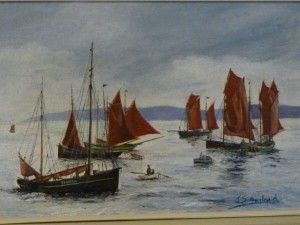 Last year I wrote about one famous Gaelic song connected to the sea – An Ataireachd Àrd, the High Surging Sea, and here’s another, Fear a’ Bhàta – the Boatman. It’s been recorded, in Gaelic and English, by countless singers and bands all over the world, and many people think it’s an Irish song, but it’s not. Jane Finlayson of Tong in Lewis wrote it at the end of the 18th century about Donald Macrae, a young fisherman from Uig.
Last year I wrote about one famous Gaelic song connected to the sea – An Ataireachd Àrd, the High Surging Sea, and here’s another, Fear a’ Bhàta – the Boatman. It’s been recorded, in Gaelic and English, by countless singers and bands all over the world, and many people think it’s an Irish song, but it’s not. Jane Finlayson of Tong in Lewis wrote it at the end of the 18th century about Donald Macrae, a young fisherman from Uig.
By all accounts the two got married not long after she wrote the song, but it’s obvious that things didn’t run smoothly in the months before. It’s a long song, but not every verse is sung – you don’t often hear verses 5 and 9, where Jane talks about her worries that Donald has a girl in every port, and her very real difficulties if he doesn’t come home soon.
You don’t feel that this is a story that will end happily. I wonder if he came back voluntarily in the end, or was he ‘encouraged?
Let’s hope that he behaved a bit better once they were married……..at least there no records of any more sad songs written by Jane!
English translation
Chorus:
Oh my boatman, na hóro eile
Oh my boatman, na hóro eile
Oh my boatman, na hóro eile
My farewell and health to you wherever you go1. It’s often that I look from the highest hill
to see if I can spot the boatman
Will you come tonight, or will you come tomorrow
Oh wretched will I be if you do not come at all2. My heart is broken, bruised
Often tears are running down from my eyes
Will you come tonight, if I wait up for you,
Or close the door with a sorrowful sigh?3. I often ask of the boatmen
If they have seen you, if you are safe
But every one of them tells me
That I was daft if I gave you love.4. My beloved promised me a gown of silk
He promised me that and a fine plaid
A golden ring in which I’d see his likeness
But I’m afraid that he may forget.5. There’s not a village where you
don’t stop for a while and take your ease,
and you get out your fancy notebook
and sing songs to entice the girls.6. Although they said you were flighty
That did not lessen my love for you
You were my dream at night
And in the morning I was asking for you.7. I gave you love and cannot deny it
It’s not love that lasts a year or a season
But a love that began when I was a child
And that will not wither until death wears me out.8. My friends are often telling me
That I must put your face out of my mind
But their advice is as vain to me
As trying to turn the incoming tide.9. My belt has risen now
Not because of a fiddler or a harpist
but because of the steersman of a boat –
and if you don’t come home, it’s wretched that I am.10. I will forever be sad and tearful
Like a white swan that has been wounded
Weeping in death on a small grassy loch
After everyone else has deserted her.
Singable English version :
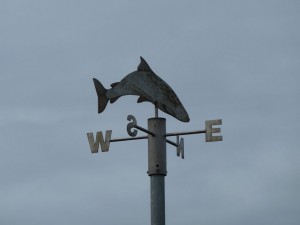 How often haunting the highest hilltops
How often haunting the highest hilltops
I scan the ocean, I sail the sea
wilt come tonight love, wilt come tomorrow
wilt ever come love to comfort me?
Fhear a bhàta no horo eile (3)
oh fare thee well love, where e’er you be
They call thee fickle, they call thee false one
and seek tae change me but all in vain
for thou art my dream all through the dark night
and every morning I scan the sea
Fear a bhàta no horo eile…
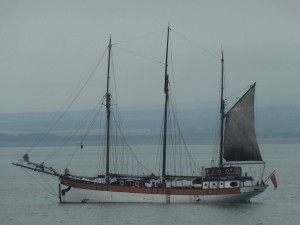 There’s not a hamlet, too well I know it,
There’s not a hamlet, too well I know it,
where you go wandering or set a while
but all the old folks you win wi’ talking
and charm its maidens wi’ song and smile
Fhear a bhàta no horo eile…
Do you remember the promise made me
the tartan plaidie, the silken gown
the ring of gold with thy hair and portrait?
that gown and ring I will never know
Fhear a bhàta no horo eile…
Some recordings on YouTube:
Capercaillie (Gaelic): http://www.youtube.com/watch?v=A5muVg_ZWek
Niamh Parsons (Irish): http://www.youtube.com/watch?v=gTo6DL6qGw8
Silly Wizard (Scots): http://www.youtube.com/watch?v=-j-dKK-4a18
Sandy Denny (English): http://www.youtube.com/watch?v=KmSoyoJRzWw
Dealbhan-ola le / paintings by Johan Sutherland
